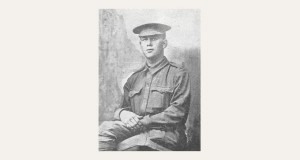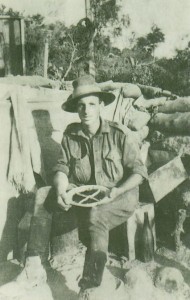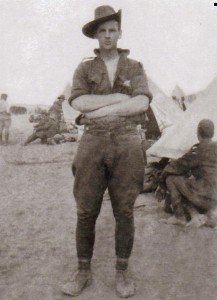WWI Stories – Corporal Edward Louis Moore
Port Melbourne
Neville Moore shares the story of his father, Corporal Edward Louis Moore, who kept a diary of his time serving in the Great War.
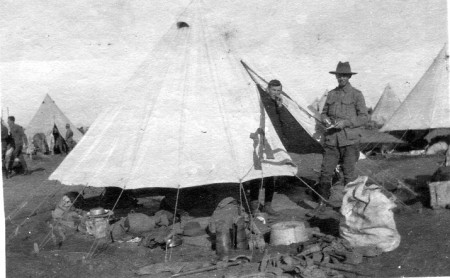 Corporal Edward Louis Moore No.75 2nd Field Company Engineers left Melbourne on the “Orvieto” and served in Gallipoli and on the Western Front. He was awarded a Military Medal in 1917 and was wounded in 1918, returning to Australia in 1919 and repatriated at Caulfield Hospital.
Corporal Edward Louis Moore No.75 2nd Field Company Engineers left Melbourne on the “Orvieto” and served in Gallipoli and on the Western Front. He was awarded a Military Medal in 1917 and was wounded in 1918, returning to Australia in 1919 and repatriated at Caulfield Hospital.
My father kept a diary of every day spent in the Army from the camp in Egypt until he returned to Williamstown in 1919.
Edward Louis Moore died in 1981 at the age of 87. He met my mother while on leave in England – she knew him only 3 days but followed him out 2 years later and they were married in Murrumbeena. They had two boys – my brother Byron born 1925 I was born in 1932. In honour of my father I intend to travel to Albany W.A. in 2014 to celebrate his departure 100 years ago.
Edward’s diaries were put into book form and donated to The Australian War Museum and the National Library Canberra and the Library in Melbourne. The diaries contain over 50 photos that he took whilst in service overseas.
Diary entries
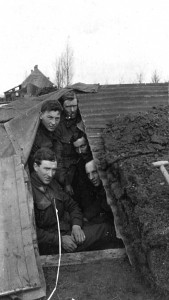 “We are all ready now, it has been a busy day for all, breakfast at 4 AM then what?? We will see, I’ll bet it won’t be all cake.” – 24 April 1915
“We are all ready now, it has been a busy day for all, breakfast at 4 AM then what?? We will see, I’ll bet it won’t be all cake.” – 24 April 1915
“We landed under fire at 7.30am, we were lucky – others were not.” – 25 April 1915
“I got a new job this morning cooking for the Officer’s mess. It will be better than working in the trenches. This afternoon I made jam tarts, first I have ever made. I had my photo taken with one with one to commemorate it for life… anyway they turned out alright and us batmen ate one in no time, and the Officers did not refuse the other, although I only put old fat and sherbet to use with the flour.” – 30 August 1915
“We had a rough time today. Two 6in unexploded shells fell into our camp and one schrapnel shell exploded in the camp and splattered everywhere. I was in my cookhouse at the time and had a jolly narrow shave. Three bullets came through and one knocked a tin of curry to bits, went through a tin of oats and landed in a bar of soap. I was covered in curry powder, it gave me a shock because the bullet must have passed within a few inches of my head. One chap was killed and one of our reinforcements was wounded through the jaw. Bullet marks were everywhere and one chaps overcoat got eleven holes through it. No bread, no fresh meat, no flour. Rotten.” – 24 November 1915
“There is only 12 of us left here now and there is nothing doing. I just got up about 8AM and cooked breakfast for 2 officers and myself. I straightaway packed my things then helped the others destroy everything of value. At last I got onto a barge and left Anzac for the last time and boarded the Prince Albert.” – 16 December 1915
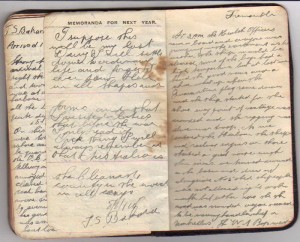 From March 1916 until being wounded in St Martins Wood, France on 23 August 1918 he was in the Somme, winning the Military Medal on 20 September 1917 on the Menin Road, although his diary, written every day, never mentions it. Even though he was badly injured he kept writing, using his left hand. He returned to Australia after recuperation in England on the Troopship Bakara, arriving 15 February 1919. His last entry in the diary says:
From March 1916 until being wounded in St Martins Wood, France on 23 August 1918 he was in the Somme, winning the Military Medal on 20 September 1917 on the Menin Road, although his diary, written every day, never mentions it. Even though he was badly injured he kept writing, using his left hand. He returned to Australia after recuperation in England on the Troopship Bakara, arriving 15 February 1919. His last entry in the diary says:
“I suppose this will be my last Diary. I will settle down to ordinary life and forget I ever saw Hell in all shapes and forms and that I visited cities that before the war I only read of. One thing I will always remember is that Australia is the cleanest country in the world in all ways.”
The photos included are of the tent he was in in Egypt, the one of himself and the one of the jam tart, tent living quarters on the Somme, and a group photo, and a page from the albums that all these photos are in, also the last diary entry.




